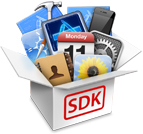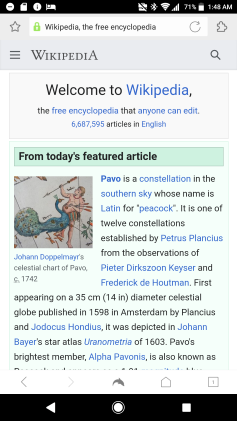
Microsoft Office, MS Office, or simply Office, is an office suite and family of client software, server software, and services developed by Microsoft. The first version of the Office suite, announced by Bill Gates on August 1, 1988 at COMDEX, contained Microsoft Word, Microsoft Excel, and Microsoft PowerPoint — all three of which remain core products in Office — and over time Office applications have grown substantially closer with shared features such as a common spell checker, Object Linking and Embedding data integration and Visual Basic for Applications scripting language. Microsoft also positions Office as a development platform for line-of-business software under the Office Business Applications brand.

Safari is a web browser developed by Apple. It is built into several of Apple's operating systems, including macOS, iOS, iPadOS and visionOS, and uses Apple's open-source browser engine WebKit, which was derived from KHTML.

Microsoft OneNote is a note-taking software developed by Microsoft. It is available as part of the Microsoft 365 suite and since 2014 has been free on all platforms outside the suite. OneNote is designed for free-form information gathering and multi-user collaboration. It gathers users' notes, drawings, screen clippings, and audio commentaries. Notes can be shared with other OneNote users over the Internet or a network.

Opera Mini is a mobile web browser made by Opera. It was primarily designed for the Java ME platform, as a low-end sibling for Opera Mobile, but as of January 2025 only the Android build was still under active development. It had previously been developed for iOS, Windows 10 Mobile, Windows Phone 8.1, BlackBerry, Symbian, and Bada.

Sleipnir is a tabbed web browser developed by Fenrir Inc. The browser's main features are customization and tab functions. It supports HTML5 and multiple layout engines.

Opera Mobile is a mobile web browser for smartphones, tablets and PDAs developed by Opera.

Zotero is free and open-source reference management software to manage bibliographic data and related research materials, such as PDF and ePUB files. Features include web browser integration, online syncing, generation of in-text citations, footnotes, and bibliographies, integrated PDF, ePUB and HTML readers with annotation capabilities, and a note editor, as well as integration with the word processors Microsoft Word, LibreOffice Writer, and Google Docs. It was originally created at the Center for History and New Media at George Mason University and, as of 2021, is developed by the non-profit Corporation for Digital Scholarship.
Android is a mobile operating system based on a modified version of the Linux kernel and other open-source software, designed primarily for touchscreen-based mobile devices such as smartphones and tablets. Android has historically been developed by a consortium of developers known as the Open Handset Alliance, but its most widely used version is primarily developed by Google. First released in 2008, Android is the world's most widely used operating system; the latest version, released on October 15, 2024, is Android 15.

iOS is a mobile operating system developed by Apple exclusively for its mobile devices. It was unveiled in January 2007 for the first-generation iPhone, which launched in June 2007. Major versions of iOS are released annually; the current stable version, iOS 18, was released to the public on September 16, 2024.

The iOS SDK, formerly the iPhone SDK, is a software development kit (SDK) developed by Apple Inc. The kit allows for the development of mobile apps on Apple's iOS and iPadOS operating systems.

UC Browser is a web browser developed by mobile internet company UCWeb, a subsidiary of the Alibaba Group. It was the most popular mobile browser in India, Indonesia, and Mali, as well as the second-most popular one in China as of 2017. Its world-wide browser share as of May 2022 is 0.86% overall according to StatCounter.

Opera is a multi-platform web browser developed by its namesake company Opera. The current edition of the browser is based on Chromium. Opera is available on Windows, macOS, Linux, Android, and iOS. Two mobile versions are still active, called Opera Mobile and Opera Mini. Opera also has a news aggregator app called Opera News with Aria, an AI-based search engine.
iOS jailbreaking is the use of a privilege escalation exploit to remove software restrictions imposed by Apple on devices running iOS and iOS-based operating systems. It is typically done through a series of kernel patches. A jailbroken device typically permits root access within the operating system and provides the right to install software unavailable through the App Store. Different devices and versions are exploited with a variety of tools. Apple views jailbreaking as a violation of the end-user license agreement and strongly cautions device owners not to try to achieve root access through the exploitation of vulnerabilities.
Flipboard is a news aggregator and social network aggregation company based in Palo Alto, California, with offices in New York, Vancouver, and Beijing. Its software, also known as Flipboard, was first released in July 2010. It aggregates content from social media, news feeds, photo sharing sites, and other websites, presents it in magazine format, and allows users to "flip" through the articles, images, and videos being shared. Readers can also save stories into Flipboard magazines. As of March 2016 the company claims there have been 28 million magazines created by users on Flipboard. The service can be accessed via web browser, or by a Flipboard application for Microsoft Windows and macOS, and via mobile apps for iOS and Android. The client software is available at no charge and is localized in 21 languages.

Dolphin Browser is a free mobile web browser developed by the company MoboTap for the Android and iOS operating systems. First released in 2009, it gained popularity as one of the earliest third-party browsers on Android. The browser is notable for its gesture-based navigation, customizable add-ons, and distinctive user interface featuring sidebars for frequently used tools. As of [last reliable update date], its development status is uncertain, and it has faced scrutiny over privacy and security concerns.
An app store, also called an app marketplace or app catalog, is a type of digital distribution platform for computer software called applications, often in a mobile context. Apps provide a specific set of functions which, by definition, do not include the running of the computer itself. Complex software designed for use on a personal computer, for example, may have a related app designed for use on a mobile device. Today apps are normally designed to run on a specific operating system—such as the contemporary iOS, macOS, Windows, Linux or Android—but in the past mobile carriers had their own portals for apps and related media content.

MIUI is a deprecated mobile operating system by Xiaomi for its smartphones and devices, from 2010 to 2023, prior to the launch of its successor Xiaomi HyperOS.
A mobile application or app is a computer program or software application designed to run on a mobile device such as a phone, tablet, or watch. Mobile applications often stand in contrast to desktop applications which are designed to run on desktop computers, and web applications which run in mobile web browsers rather than directly on the mobile device.
Microsoft mobile services are a set of proprietary mobile services created specifically for mobile devices; they are typically offered through mobile applications and mobile browser for Windows Phone platforms, BREW, and Java. Microsoft's mobile services are typically connected with a Microsoft account and often come preinstalled on Microsoft's own mobile operating systems while they are offered via various means for other platforms. Microsoft started to develop for mobile computing platforms with the launch of Windows CE in 1996 and later added Microsoft's Pocket Office suite to their Handheld PC line of PDAs in April 2000. From December 2014 to June 2015, Microsoft made a number of corporate acquisitions, buying several of the top applications listed in Google Play and the App Store including Acompli, Sunrise Calendar, Datazen, Wunderlist, Echo Notification Lockscreen, and MileIQ.










